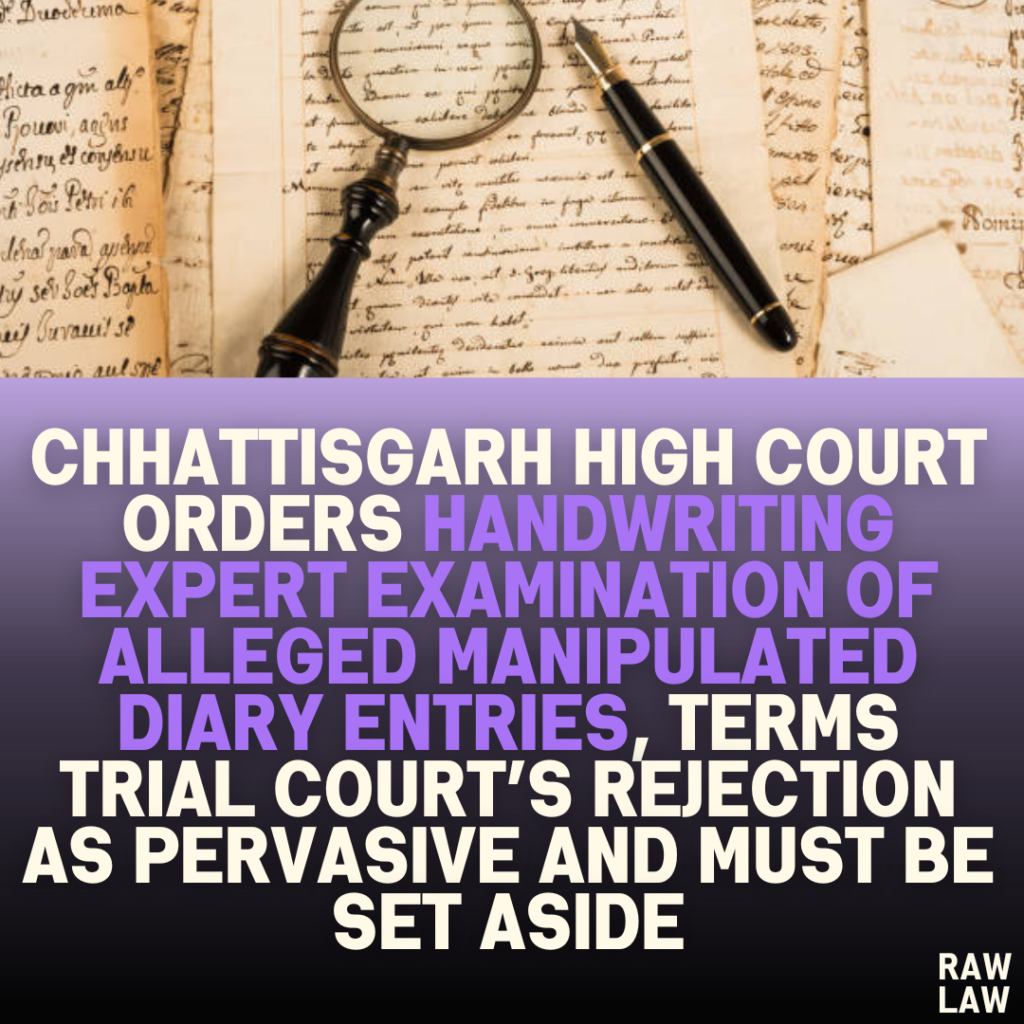Court’s Decision:
The High Court of Chhattisgarh set aside the trial court’s order, which had rejected an application to examine alleged manipulations in a diary maintained by the respondent. The court held that the petitioner’s request to examine these manipulations by a handwriting expert was justified, ordering that the original diary be submitted to the trial court for expert examination. The petitioner is to bear the cost of the handwriting expert.
Facts:
The petitioner alleged that the respondent, with whom he had an oral agreement for constructing a house, made payments on various dates, which were recorded in a diary maintained by the respondent. The petitioner claimed that certain entries in the diary, initially recorded as Rs. 5,000, Rs. 4,000, Rs. 8,000, and similar amounts, were manipulated by the respondent, who allegedly added a ‘zero,’ turning these amounts into Rs. 50,000, Rs. 40,000, Rs. 80,000, etc.
The petitioner filed a civil suit to recover Rs. 3,42,762, and it was only after the respondent submitted the diary as part of the written statement that the petitioner realized the entries had been altered. Subsequently, the petitioner filed an application under Section 47 of the Indian Evidence Act, along with Order 16 Rule 02(02) of the CPC, to have the entries examined by a handwriting expert. The trial court rejected this application.
Issues:
The key issue was whether the trial court erred in dismissing the petitioner’s application for handwriting analysis of the disputed diary entries, where the petitioner alleged manipulation of the recorded amounts.
Petitioner’s Arguments:
The petitioner argued that the manipulation in the diary could only be verified by a handwriting expert. Without such an examination, it would be impossible to confirm whether the figures had been altered by adding zeros. The petitioner contended that the trial court’s rejection of the application was unjust, as handwriting analysis was crucial to determining the truth of the allegations.
Respondent’s Arguments:
The respondent’s counsel contended that there was no need for interference by the High Court, as the trial court had correctly decided that the petitioner could prove his case through other means of evidence, and no handwriting analysis was required.
Analysis of the Law:
The court noted that Section 47 of the Indian Evidence Act allows for handwriting to be proven by an expert witness, and Order 16 Rule 02(02) of the CPC permits a party to request the court’s assistance in securing expert examination where necessary. The petitioner had a legitimate right to verify whether the figures in the diary were manipulated.
Precedent Analysis:
While the court did not cite any specific precedents in this case, it relied on established principles allowing the examination of disputed handwriting through expert testimony when such an issue arises in a civil dispute.
Court’s Reasoning:
The High Court observed that, upon perusal of the diary entries, there appeared to be overwriting in some of the figures, supporting the petitioner’s claim that amounts had been altered. The court concluded that handwriting examination was a necessary step in resolving the dispute and that the trial court’s decision to reject the application was perverse.
Conclusion:
The High Court allowed the petition, set aside the trial court’s order, and directed the respondent to submit the original diary to the trial court. The trial court was further instructed to arrange for the disputed entries to be examined by a handwriting expert, with the costs to be borne by the petitioner.
Implications:
This ruling underscores the importance of allowing parties in civil disputes the opportunity to verify claims of forgery or manipulation through expert analysis. It affirms the right of a party to request the court’s assistance in securing such examination when the authenticity of documents is contested.




Pingback: Bombay High Court Rules Rental Income from Leasing Properties as “Income from Profits and Gains of Business,” Rejecting Tribunal's Reliance on East India Housing - Raw Law
Pingback: Chhattisgarh High Court Directs Reconsideration of Meritorious Candidate for Pharmacist Grade-II Appointment Citing Superior Qualifications, Allows Claims for Seniority and Arrears - Raw Law
Pingback: Supreme Court Reinstates Conviction, Rejects High Court’s Remand; Upholds Section 294 of CrPC and Clarifies Misapplication of Munna Pandey Case - Raw Law